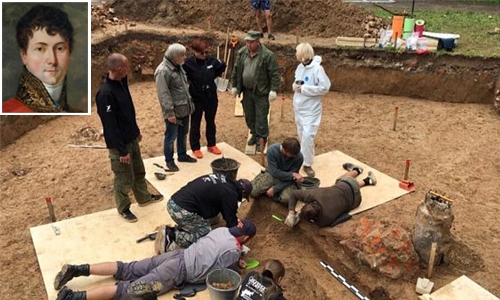DNA to solve mystery of Napoleon’s general lost in Russia
Archaeologists are set to unveil the answer to a 200-year-old question over the remains of a French general who died during Napoleon’s 1812 campaign in Russia. Charles Etienne Gudin was hit by a cannonball in the Battle of Valutino on August 19 near Smolensk, a city west of Moscow close to the border with Belarus. His leg was amputated and he died three days later from gangrene, aged 44.
The French army cut out his heart, now buried at the Pere Lachaise cemetery in Paris, but the site of the rest of his remains was never known, until researchers found a likely skeleton this summer. “As soon as I saw the skeleton with just one leg, I knew that we had our man,” the head of the Franco-Russian team that discovered the remains in July, Marina Nesterova, told AFP.
Genetic analysis is being carried out to confirm the identity, using DNA from one of the general’s descendants, with the results to be announced on Thursday. Gudin is said to have been one of Napoleon’s favourite generals and the two men attended military school together. His name is engraved on the Arc de Triomphe monument in Paris. The fresh search for his remains has been underway since May, funded by a Franco-Russian group headed by Pierre Malinowski, a historian and former soldier with ties to the French far-right and support from the Kremlin.
The team in Smolensk first followed the memoirs of a subordinate of Gudin, Marshall Davout, who organised the funeral and described a mausoleum made of four cannon barrels pointing upward, said Nikolai Makarov, the director of the Russian Institute of Archaeology. When that trail ran cold, they checked another theory by a witness of the funeral and found pieces of a wooden casket buried under an old dance floor in the city park.
A preliminary report concluded that the skeleton belonged to a man who died aged 40-45. Gudin’s death near Smolensk came near the beginning of Napoleon’s march toward Moscow, 400 kilometres (250 miles) further east. Napoleon had hoped to defeat the Russian army at Valutino and sign an advantageous treaty, but it managed to escape and Russian Tsar Alexander refused to discuss peace.
“This battle could have been decisive if Napoleon hadn’t underestimated the Russians,” Malinowski said. “Heavy losses in this battle showed Napoleon that he was going to go through hell in Russia.” Napoleon’s march on Russia ended in a disastrous retreat as Russians used scorched earth tactics and even ordered Moscow to be burnt to sap Napoleon’s resources. Less than 10 percent of his Grand Armee survived Russian invasion.
Related Posts

